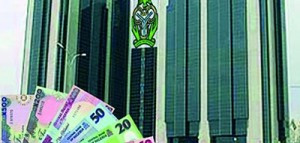CASH-LESS POLICY: Bankers Protest CBN Charges, Say Will Kill Businesses
 *Deposit, withdrawal attract charges
*Deposit, withdrawal attract charges
*Expert:” It will curb crime rate”
As the Central Bank of Nigeria(CBN) gears up to commence the implementation of the cash-less policy nationwide in April 1st, 2017, many commercial banks branches have complained that the charges on fund deposits and withdrawals as reviewed are high and could scare customers away from banking services, especially when there are too many banking charges already. Some bank managers simply submitted that the charges are unrealistic because they sound more punitive than business-like.
The Bankers’ Committee at its 493th meeting reviewed the charges, as on the counter individual single deposit of N500,000 to N1million attracts 1.5 percent of the fund, while withdrawals of the same amount attracts 2 percent charges. N1million to N5million deposit attract 2 percent as withdrawal takes 3percent. Deposit above N5million attracts 3 percent while withdrawal takes 7.5 percent of the sum withdrawn.
A corporate account lodgment of N3million to N10million attracts 2 percent while withdrawal of same amount takes 5 percent; N10million to N40million attracts 3 percent for deposit and 7.5 percent for withdrawal; funds above N40million attracts 5 percent charges on the counter as withdrawal attracts 10 percent.
The income generated from these charges will be shared by the commercial banks and CBN in the ratio of 40 and 60 percent.
According to an Access Bank Manager in Lagos, “We expect the CBN to come out with financial inclusive policy that could help to mobilize funds from the informal sector not a policy that is tilted towards discouraging traders and artisans from using banking services. From experience, however, this will not work in real sense of it because banks will ideally adopt flexibility as a business sense. Nobody wants lose a customer to another because of bank charges.”
A top-notch banker in Sterling bank, feels that banks are over regulated. “We need to go cash-less but we need not be punitive to achieve a cash-less society. We need to encourage customers via incentives. Most of these funds are already over taxed before deposit to banks and in banks other rounds of taxes are there, like the stamp duty, service charges that replaced the Cost of Transaction (COT)”.
A marketer in Zenith Bank described the cashless policy charges as unfortunate, saying “they can seat back in their offices and churn out policies but we are the people on ground to tell them what will fly or not. I am even more disappointed that our directors and management Ogas are part of the Bankers’ Committee that fashioned the policy. We must get customers, that is all I know and we must make efforts to keep them. However, it is not small business-friendly”.
MMS Plus survey has also revealed that some of the cashless services channels like the Automated Teller Machines (ATMs) and Point of Sale (POS) machines are hugely becoming liabilities for banks and service providers like malls and shops. Most ATMs of banks are hardly functional on week days, as customers experience more ATM service failures weekends, thereby creating integrity crisis for banks. The use of POS services in most supermarkets in Lagos is on the decline as a result of network failure. A survey of mobile and internet banking services among banks show that while nudge to “belong” among some customers is up, the bad service delivery from their bank using the channels discourage them from further subscription.
According to the apex bank circular to all banks signed by the Director of Banking &Payment System Department, Mr. Dino Fatokun, the new charges will take effect from April 1st, 2017 in the existing cashless states, which are: Lagos, Ogun, Kano, Abia, Anambra, Rivers and the Federal Capital Territory (FCT).
The policy will be implemented with the charges taking effect on May 1st, 2017 in Bauchi, Bayelsa, Delta, Enugu, Gombe, Imo, Kaduna, Ondo, Osun, and Plateau states; while on August 1st,2017, has been scheduled to take effect in Edo,Katsina,Jigawa,Niger,Oyo,Adamawa,Akwa-Ibom, Ebonyi, Taraba,and Nasarawa states.
On October 1st, 2017, Borno,Benue,Ekiti, Cross River,Kebbi,Kogi,Kwara, Yobe,Sokoto,and Zamfara states will kick-off their implementation of the policy.
Exemptions in the policy include revenue generating accounts of the Federal, States and Local governments for lodgments only; Embassies, diplomatic missions, multilateral and aids donor agencies in Nigeria also exempted.
In his reaction, the Managing Director of Cowry Assets Management Limited, Mr. Johnson Chukwu, said, “The challenge of the cashless policy is that there are still States that do not have effective network coverage particularly for data services. So, in such locations it would be difficult to do internet payment and mobile banking. However, I think we should welcome the cashless policy because when it kicks off, it would compel the telecommunication companies to improve their services especially in rural areas.
“There are several benefits that would be derived from the implementation of the cashless policy nationwide. One is that it would reduce the rate of criminal activities like kidnapping for ransom which requires exchange of money. It would be difficult for the victims to withdraw the cash and also difficult for the kidnappers to use a bank account. The issues of armed robbery would reduce and also the corruption in the country. Some of the benefits outweigh the disadvantages.
“This policy should have kicked off over three years ago but there has been a delay. Since that time, the nation has witnessed better service delivery which should support the cashless policy in the country. I support the policy but I also insist that where there are service gaps with respect to the telecommunication service providers, then the CBN should grant waivers to such localities.” He noted.
“We need to minimize the cost of doing transactions in the banking system by reducing the maintenance fees and canceling the stamp duty on deposits into customers’ accounts. Such payment is for custodian; it is not a payment that should attract service charge or stamp duty. Deposit slips shouldn’t be considered as receipts because receipts ought to be evidence of payment for services or goods.” He added.
On the rift between the CBN and the Federal Ministry of Finance, Mr. Johnson said, “The Minister of Finance, Mrs. Kemi Adeosun has not elaborated on which powers of the CBN she wants to be curbed. Is it powers as relates to the monetary policies or powers on the supervision of the financial system? Or is she stating that the two powers shouldn’t reside in CBN?”
However, he observed, “in order to make CBN a better agency, I think the President should constitute the Board of Directors at the CBN. This would ensure that there would be more robust discussions at the bank. Today, there is no board and no matter how brilliant an individual is, he or she cannot produce the benefits of collective wisdom. The Act that establishes CBN requires the bank to have a Board of Directors and this has a purpose. So, the best way to start reforms at CBN would be to constitute that board of directors.”







